Related Research Articles

The Shining is a 1977 horror novel by American author Stephen King. It is King's third published novel and first hardcover bestseller; its success firmly established King as a preeminent author in the horror genre. The setting and characters are influenced by King's personal experiences, including both his visit to The Stanley Hotel in 1974 and his struggle with alcoholism. The novel was adapted into a 1980 film and a 1997 miniseries. The book was followed by a sequel, Doctor Sleep, published in 2013, which in turn was adapted into a film of the same name in 2019.

Toad of Toad Hall is a play written by A. A. Milne – the first of several dramatisations of Kenneth Grahame's 1908 novel The Wind in the Willows – with incidental music by Harold Fraser-Simson. It was originally produced by William Armstrong at the Playhouse Theatre, Liverpool, on 21 December 1929. It was given in the West End the following year, and has been revived frequently by many theatrical companies.
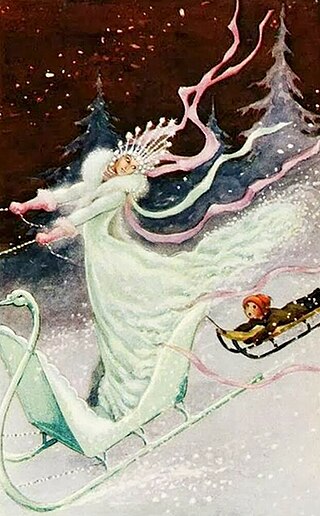
"The Snow Queen" is an 1844 original fairy tale by Danish author Hans Christian Andersen. It was first published 21 December 1844 in New Fairy Tales. First Volume. Second Collection. The story centers on the struggle between good and evil as experienced by Gerda and her friend, Kai. Unlike Andersen's other stories, The Snow Queen is written in a novel-styled narrative, being divided into seven chapters.
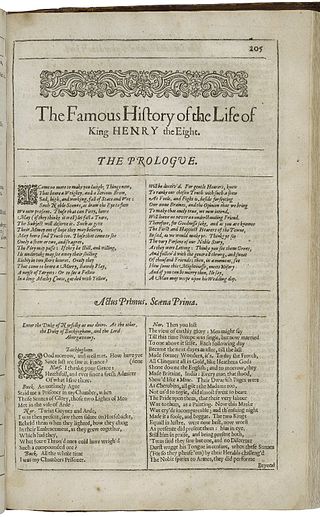
The Famous History of the Life of King Henry the Eighth, often shortened to Henry VIII, is a collaborative history play, written by William Shakespeare and John Fletcher, based on the life of Henry VIII. An alternative title, All Is True, is recorded in contemporary documents, with the title Henry VIII not appearing until the play's publication in the First Folio of 1623. Stylistic evidence indicates that individual scenes were written by either Shakespeare or his collaborator and successor, John Fletcher. It is also somewhat characteristic of the late romances in its structure. It is noted for having more stage directions than any of Shakespeare's other plays.
A prologue or prolog is an opening to a story that establishes the context and gives background details, often some earlier story that ties into the main one, and other miscellaneous information. The Ancient Greek word πρόλογος includes the modern meaning of prologue, but was of wider significance, more like the meaning of preface. The importance, therefore, of the prologue in Greek drama was very great; it sometimes almost took the place of a romance, to which, or to an episode in which, the play itself succeeded.

An epilogue or epilog is a piece of writing at the end of a work of literature, usually used to bring closure to the work. It is presented from the perspective of within the story. When the author steps in and speaks directly to the reader, that is more properly considered an afterword. The opposite is a prologue—a piece of writing at the beginning of a work of literature or drama, usually used to open the story and capture interest. Some genres, for example television programs and video games, call the epilogue an "outro" patterned on the use of "intro" for "introduction".

Owen Ramsay Nares was an English stage and film actor. Besides his acting career, he was the author of Myself, and Some Others (1925).
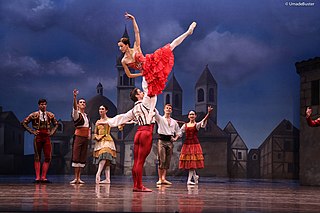
Don Quixote is a ballet in three acts, based on episodes taken from the famous novel Don Quixote de la Mancha by Miguel de Cervantes. It was originally choreographed by Marius Petipa to the music of Ludwig Minkus and first presented by Moscow's Bolshoi Ballet on 26 December [O.S. 14 December] 1869. Petipa and Minkus revised the ballet into a more elaborate and expansive version in five acts and eleven scenes for the Mariinsky Ballet, first presented on 21 November [O.S. 9 November] 1871 at the Imperial Bolshoi Kamenny Theatre of St. Petersburg.
The Woman's Prize, or the Tamer Tamed is a Jacobean comedy written by John Fletcher. It was first published in the first Beaumont and Fletcher folio of 1647, though it was written several decades earlier. There is no doubt that the play is the work of Fletcher alone; his highly distinctive and characteristic pattern of linguistic preferences is continuous through the text.
The Loyal Subject is a Jacobean era stage play, a tragicomedy by John Fletcher that was originally published in the first Beaumont and Fletcher folio of 1647.
Dracula is an adaptation, first published in 1996, by American playwright Steven Dietz of Bram Stoker's 1897 novel by the same name. Though it has never run on Broadway, the author lists it among his most financially successful works, and it is frequently performed near Halloween in regional and community theaters. Closely following the plot of the novel, the play chronicles Count Dracula's journey to England, his stalking of two young women, and his pursuit and eventual defeat by the heroines' suitors and their associates.

Rape upon Rape; or, The Justice Caught in his own Trap, also known as The Coffee-House Politician, is a play by Henry Fielding. It was first performed at the Haymarket Theatre on 23 June 1730. The play is a love comedy that depicts the corruption rampant in politics and in the justice system. When two characters are accused of rape, they deal with the corrupt judge in separate manners. Though the play was influenced by the rape case of Colonel Francis Charteris, it used "rape" as an allegory to describe all abuses of freedom, as well as the corruption of power, though it was meant in a comedic, farcical manner.

The Faithful Heart is a 1932 British drama film directed by Victor Saville and starring Herbert Marshall, Edna Best and Anne Grey. It is based on the 1921 play The Faithful Heart by Monckton Hoffe. It was made at Islington Studios of Gainsborough Pictures in London. The film's sets were designed by Alex Vetchinsky.
The Faithful Heart is a 1922 British drama film directed by Fred Paul and starring Owen Nares, Lillian Hall-Davis and Cathleen Nesbitt. It is an adaptation of the play The Faithful Heart by Monckton Hoffe.

Common Clay is a 1914 play by Cleves Kinkead. Its structure varied by production: it started with a prologue, three acts and an epilogue. The prologue was later dropped, and still later, the epilogue was converted to a fourth act. It has three settings, and fourteen characters. The story concerns the dismissal of a young servant when she becomes pregnant by her employer's son, and her subsequent fight for justice. The action of the play spans ten years time. The play won the John Craig Prize, also referred to as the Harvard Prize, given annually to the best work produced in conjunction with George Pierce Baker's playwriting workshop at Harvard.
The Lady's Revenge, or the Rover Reclaim'd is a 1734 comedy play by the British writer William Popple.
The Patriot, or, The Italian Conspiracy is a 1702 tragedy by the English writer Charles Gildon. Based on the life of Cosimo de' Medici but also inspired by Nathaniel Lee's 1680 work Lucius Junius Brutus set during the Roman Republic.

A Bold Stroke for a Husband is a 1783 comedy play by the British writer Hannah Cowley. The title is a variation on Susanna Centlivre's A Bold Stroke for a Wife. The original Covent Garden cast included William Thomas Lewis as Don Julio, Richard Wroughton as Don Carlos, John Quick as Don Caesar, John Edwin as Don Vincentio, Richard Wilson as Gasper, John Whitfield as Don Garcia, James Fearon as Vasquez, Mary Robinson as Victoria, Sarah Maria Wilson as Minette, Mary Whitfield as Laura, Harriet Pitt as Sancha and Isabella Mattocks as Olivia. The epilogue was written by John O'Keeffe. The play is in five acts and is set in Madrid.
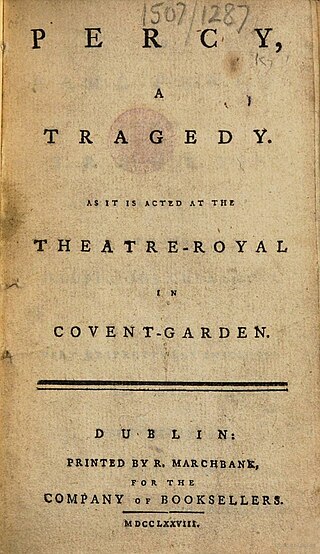
Percy is a 1777 tragedy by the British writer Hannah More. It was inspired by the French play Gabrielle de Vergy by Pierre-Laurent Buirette de Belloy. The play premiered at the Covent Garden Theatre in London. The original cast included William Thomas Lewis as Percy, Francis Aickin as Earl Raby, Thomas Hull as Sir Hubert, John Whitfield as Edric, Thomas Robson as Harcourt, James Thompson as Servant, Richard Wroughton as Earl Douglas and Ann Street Barry as Elwina. David Garrick wrote both the prologue and epilogue.
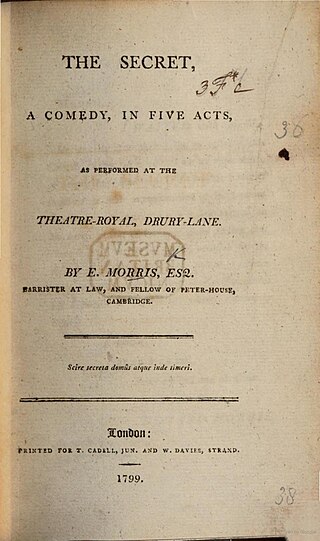
The Secret is a 1799 comedy play by the British writer Edward Morris. It premiered at the Theatre Royal, Drury Lane in London on 2 March 1799 and enjoyed a run of seventeen performances that season. The original cast included William Barrymore as Mr Dorville, Robert Palmer as Sir Harry Fleetly, Richard Suett as Mr Lizard, Charles Bannister as Jack Lizard, William Dowton as Mr Torrid, Charles Kemble as Henry Torrid, George Wathen as Ralph, Walter Maddocks as Steward, Jane Powell as Mrs Esther Dorville, Dorothea Jordan as Rosa and Jane Pope as Susannah Lizard. The prologue was written by Charles Morris and the epilogue by George Colman the Younger.